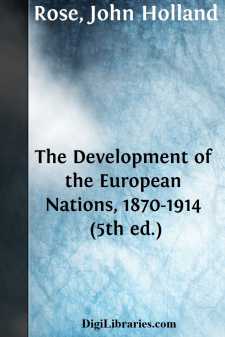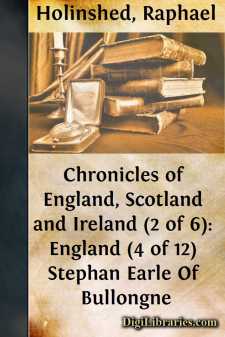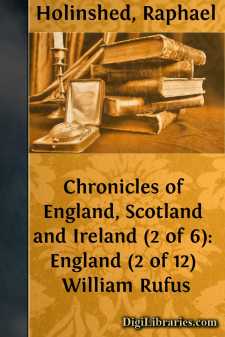History
- Africa 30
- Americas (North Central South West Indies) 50
- Ancient 68
- Asia 58
- Australia & New Zealand 8
- Canada 41
- Caribbean & West Indies 1
- Civilization 20
- Eastern Europe 12
- Europe 310
- Expeditions & Discoveries 60
- General 77
- Historical Geography 1
- Jewish 9
- Latin America 3
- Medieval 8
- Middle East 13
- Military 248
- Revolutionary 8
- Study & Teaching 5
- United States 353
- Western Europe 56
- World 13
History Books
Sort by:
CHAPTER I THE CAUSES OF THE FRANCO-GERMAN WAR"After the fatal year 1866, the Empire was in a state of decadence."--L. GREGOIRE,Histoire de France. The irony of history is nowhere more manifest than in the curious destiny which called a Napoleon III. to the place once occupied by Napoleon I., and at the very time when the national movements, unwittingly called to vigorous life by the great...
more...
HENRIE THE SECOND, The Second Sonne of Geffrey Plantagenet. An. Reg. 1. Henrie the second of that name, a French man borne, the second sonne of Geffrey Plantagenet earle of Aniou, begotten of Maud the empresse, daughter to Henrie the first, began his reigne ouer England the fiue and twentith of October, in the yeare after the creation of the world 5121. and in the yeare after the incarnation of our...
more...
RICHARD THE FIRST, Second sonne to Henrie the second. An. Reg. 1.1189. Richard the first of that name, and second sonne of Henrie the second, Wil. Paruus. began his reigne ouer England the sixt day of Julie, in the yere of our Lord 1189. in the seauen and thirteeth yeare of the emperour Frederike the first, in the eleuenth yere of the reigne of Philip the second king of France, and king William...
more...
STEPHAN EARLE OF BULLONGNE. 1135.An. Reg. 1. Stephan earle of Bullongne, the sonne of Stephan erle of Blois, by his wife Adela, daughter to William Conquerour, came ouer with all speed after the death of his vncle, and tooke vpon him the gouernement of the realme of England, partlie through confidence which he had in the puissance and strength of his brother Theobald earle of Blois, and partlie by...
more...
THE FIGHT OFF CAPE ST. VINCENT THE SCEPTRE OF THE SEA. "Old England's sons are English yet,Old England's hearts are strong;And still she wears her coronetAflame with sword and song.As in their pride our fathers died,If need be, so die we;So wield we still, gainsay who will,The sceptre of the sea. We've Raleighs still for Raleigh's part,We've Nelsons yet unknown;The pulses...
more...
by:
Anonymous
A DECLARATION OFTHE CAVSES, WHICH MOVEDthe chiefe Commaunders of the Nauie ofher most excellent Maiestie the Queene of England, in their voyage and expedition for Portingall, to take and arrest in the mouth of the riuer of Lisbone, certaine shippes of Corne, and other prouisions of warre bounde for the said Citie, prepared for the seruices of the King of Spaine, in the ports and Prouinces within and...
more...
Considering with my selfe, right Honorable and my singular good Lord, how redie (no doubt) manie will be to accuse me of vaine presumption, for enterprising to deale in this so weightie a worke, and so far aboue my reach to accomplish: I haue thought good to aduertise your Honour, by what occasion I was first induced to vndertake the same, although the cause that moued me thereto hath (in part) yer...
more...
WILLIAM RUFUS, OR WILLIAM THE RED. 1087.An. Reg. 1. William, surnamed Rufus or William the Red, second sonne to William Conqueror, began his reigne ouer England the ninth of September, in the yeare 1087. about the 31. yeare of the emperour Henrie the fourth, and the 37. of Philip the first, king of France, Urbane the second then gouerning the sée of Rome, and Malcolme Cammoir reigning in Scotland....
more...
HENRIE THE FIRST, YOONGEST SONNETO WILLIAM THE CONQUEROUR. Henrie the yoongest sonne to William the first, brother to Rufus latelie departed, the first of that name that ruled heere in England, & for his An. Reg. 1.1100. knowledge in good literature surnamed Beauclerke, was admitted king by the whole assent of the lords and commons, and began his reigne ouer England the first of August, in the...
more...
by:
Isaac Newton
CHAP. I. Of the Chronology of the First Ages of the Greeks. All Nations, before they began to keep exact accounts of Time, have been prone to raise their Antiquities; and this humour has been promoted, by the Contentions between Nations about their Originals. Herodotus tells us, that the Priests ofEgyptreckoned from the Reign ofMenesto that ofSethon, who putSennacheribto flight, three hundred forty and...
more...











